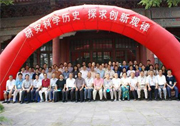| 中文题目: | 鲁迅与顾琅早期地质作品新论——《中国地质略论》与《中国矿产志》知识来源考 | ||||||
| 英文题目: | A new analysis of the early geological works of LU Xun and GU Lang--Case studies on the sources of An Outline of the Geology of China and The Mineral Records of China | ||||||
| 作 者: | 白育坊;孙承晟 | ||||||
| 刊物名称: | 地质论评 | ||||||
| 发表年度: | 2023-07-15 | ||||||
| 卷: | 69 | ||||||
| 期: | 04 | ||||||
| 页码: | 1589-1605 | ||||||
| 中文摘要: | 鲁迅在日本留学期间曾于1903年在《浙江潮》发表《中国地质略论》一文,1906年与同到日本留学的顾琅合作出版《中国矿产志》(附《中国矿产全图》)一书。它们在中国地质学史上均具有开创性并产生重要影响,特别是《中国矿产志》被认为是中国第一部地质矿产著作。本文从中日地质学交流的角度,结合新发现的史料,通过文本对比分析,指出《中国地质略论》和《中国矿产志》均是吸收当时日本的一些地学著作编写而成。《中国地质略论》的地史学内容主要来源于佐藤传藏《地质学》(1898)一书,有关煤炭内容以及中国煤田分布图则来自日本海军少将肝付兼行发表在《太阳》(1903)杂志上的《东方之煤源》一文;《中国矿产志》的导言部分是在《中国地质略论》的基础上拓展而成,增补的内容则参考了矢津昌永的《清国地志》(1905)、横山又次郎的《地质学教科书》(1903)以及石川成章的《地球发达史》(1904)等著作,本言部分主要参考了日本地质调查所1902年发表的《清国及韩国主要矿产颁布图说明——附清国主要矿产地名表》;《中国矿产全图》则是顾琅依据日本《清国主要矿产分布图》绘制而成。《中国地质略论》和《中国矿产志》(附《中国矿产全图》)的编撰很大程度上是面对西方列强觊觎中国警醒国人而作,也反映了20世纪初日本逐渐成为中国地质学知识的主要来源。 |
||||||
| 英文摘要: | During his study in Japan, LU Xun published "An Outline of the Geology of China" in Zhejiang Chao in 1903. Three years later, GU Lang and LU Xun, who went to study in Japan together, jointly published a book entitled The Mineral Records of China (and Complete map of Minerals of China). These two works were pioneering and had an important impact at the time. In particular, The Mineral Records of China is regarded as the first geological and mineral work in China. From the perspective of geological exchanges between China and Japan, through detailed textual studies, this article analyses the sources of these two works and points out that both of these two works were composed by drawing on geological works in Japna at that time. Part of the contents of "An Outline of the Geology of China" was adapted from Geology (1898) by Sato Denzou, while the contents about coal sources and the map of the coal distribution in China were derived from "The coal sources in the East Asia" (1903) by Kimotsuki Kaneyuki. The introduction part of The Mineral Records of China was expanded on the basis of "An Outline of the Geology of China" and referred to Yatsu Akinaga's Qing's Geography (1905), Yokoyama Matajirou's A Textbook of Geology (1903) and Ishikawa Nariaki's History of the Development of the Earth (1904), while the main body was largely derived from The Map of Major Mines in Korea and Qing Dynasty which was published in Bulletin of the Imperial Geological Survey of Japan in 1902. The formation of these two works, which was a warning to the nation in the face of Western powers attempting to carve up China, reflected that Japan gradually became the main source of geological knowledge in China at the beginning of the 20th Century. |
||||||





